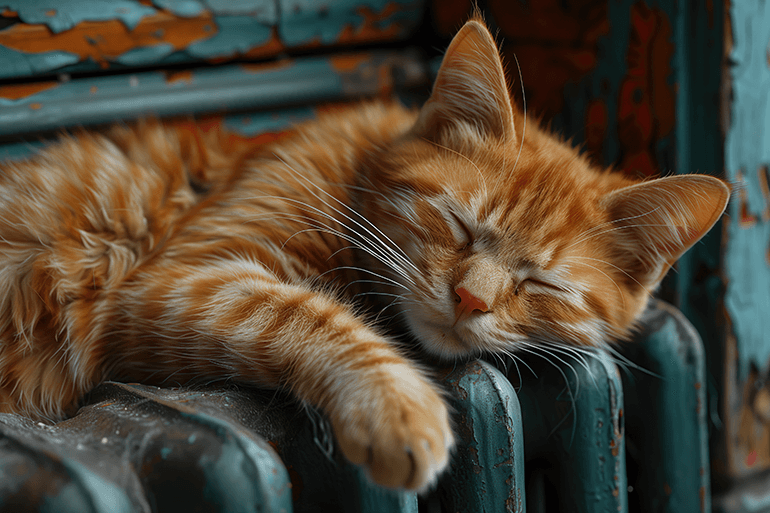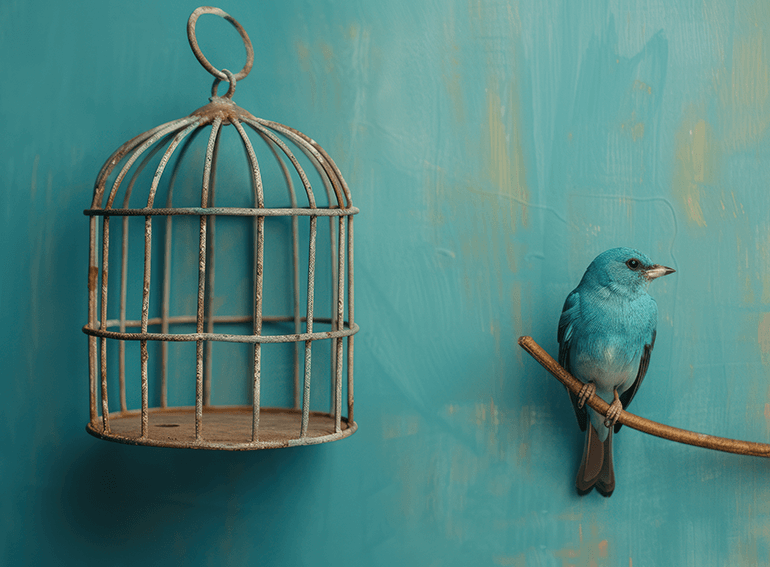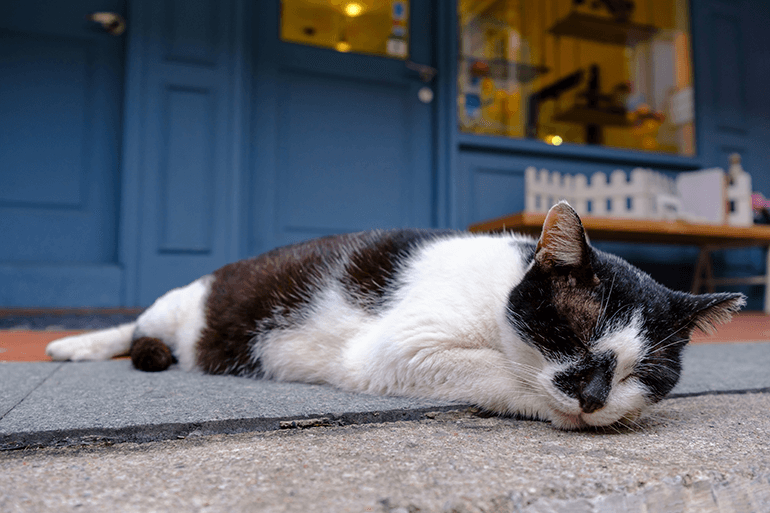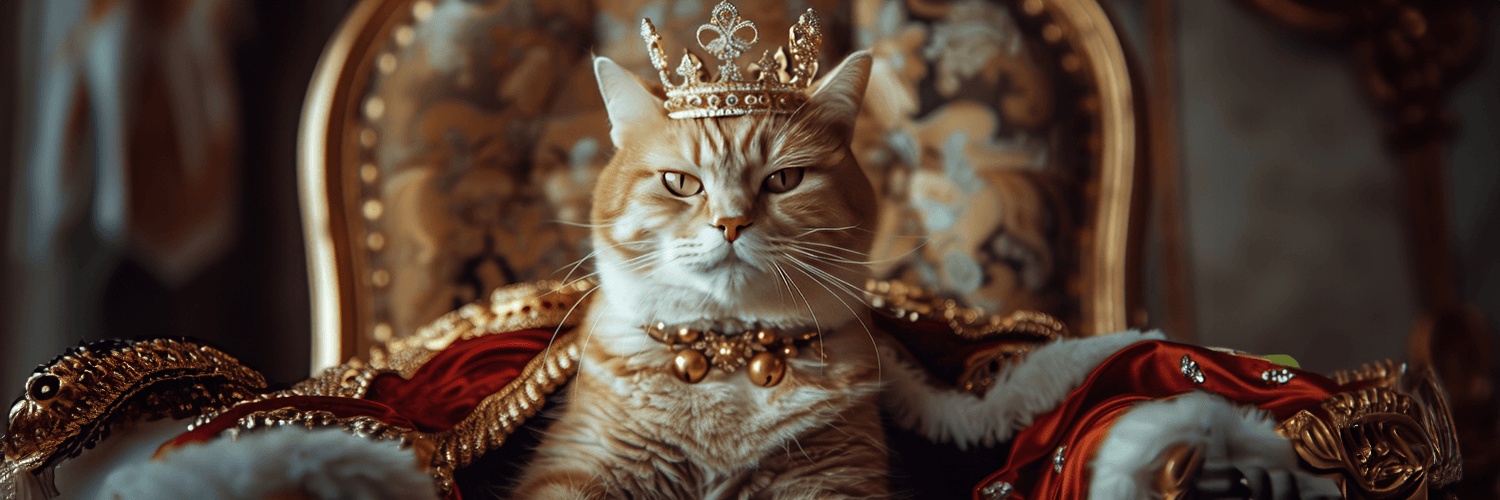
Cats, with their natural dominance and independence, often seem to rule the spaces they inhabit, commanding attention and affection on their own terms. This quality is much like the dynamics found in open or poly relationships, where individuals navigate the delicate balance of shared love and autonomy. It also resonates with the lives of those who identify as dominant, whom are often confident, self-assured, and in control. But beneath this surface of the control and freedom lies a quieter truth, one of fleeting connections and the potential for deep loneliness.
The story of a stray cat in my neighbourhood serves as a thoughtful reflection on the beauty and sadness inherent in these forms of relationship, where love is abundant yet often fails to provide a true sense of belonging.
A Stray King
He was a familiar sight on our street, an old but friendly black-and-white cat, large and imposing, who spent his days lounging in various sunlit spots along the wall adjacent to the footpath. Often, he could be found near the street sign, sitting proudly like a sentinel, a guardian over his kingdom, his territory, and his people.
Despite the ragged edges of his left ear and his misshapen whiskers, he was a well-groomed and heavy fellow, clearly well-fed and well-cared-for. He was a fine-looking, majestic cat who made it clear that he was his own boss. He lived life on his terms, and those who loved him were simply granted the privilege of sharing his world. It was his street – he was just letting us live there.
Our relationship, however, was anything but simple. He would often stay with me for weeks, sometimes even months, a shadow by my side. Then, just as suddenly, he would disappear, his absence stretching for days, even weeks, much like poly relationships, with their physical and emotional distances. It was difficult to love and let go, to care for someone on their own schedule. To love something so deeply, yet grant it freedom, knowing that if it never returned, it would break your heart.

Sudden Absence
Even during his absences, he could often be spotted in his favourite place along the wall, a comforting and reassuring sight. When he chose not to be with me, it was clear he was thriving elsewhere, exercising his freedoms. That was, until one day, he disappeared entirely. Weeks turned into months, and eventually, we took it upon ourselves to put up missing posters. The cat wasn’t ours, and we risked potential opposition from his real owners, but at that point, our concern for his safety outweighed potential conflict.
Many people got in touch. One lady told us how he helped her catch mice in her garden. Another shared that he was friendly with her cats. Someone else said he would sleep on her expensive bed linen, sunning himself as usual. Despite our numerous posters, however, no one came forward to claim him.
The Balance of Freedom and Responsibility in Love
They say cats have many homes, and I’ve certainly cared for those who have crossed my path. It’s a wonderful thing to receive the love and attention of a creature without having to shoulder responsibility for it. Someone else takes care of the worry, the anxiety, the vet bills, and the concern for their well-being.
While I’m not trying to compare cats to people, I am drawing parallels between the balance of freedom and responsibility in relationships, and where the true axis for deeper, more fulfilling connections lies.
“Can love without responsibility even be considered true love?”
Some may say it’s needy or insecure to want someone by your side when you’re scared. Others might think it’s selfish to want to share special occasions when there are other partners in other places. But when you’re alone, unwell, or worried about your health, will they be there?
Isn’t it in those intimate moments of care, in standing by someone during the challenging times, that love truly shows itself? Wiping away tears, embracing the hard times because the love is so strong it’s part of the package deal? In many ways, perhaps love is responsibility, and being there for someone when they’re at their worst because its often when they need us the most.

Illusion of Freedom
On reflection, the cat, given his freedom, was never tied down to the obligations or expectations of a single home. Does this not parallel the appeal of polyamory? The freedom to explore multiple connections and experiences, yet with the understanding that this very freedom can come at the cost of deep and enduring security, where a more profound love and connection might have truly blossomed?
Just like that seemingly dominant, well-groomed cat, those of us who navigate the complex terrains of polyamory within BDSM must acknowledge the delicate balance between independence and the deep-seated need for connection. While the freedom to explore multiple bonds can be exhilarating, it’s essential to remember the times when, like our black and white friend, we might need a safe haven, someone to take us to the vet, sit with us on a lonely holiday, or simply be there, offering the unconditional care we often provide to others.
An Unclaimed Heart
In the end, the cat simply vanished, leaving behind only the faint memories of his presence. We searched, called out, and hoped, but he never returned. His absence was a silent reminder that, for all the affection we had given him, none of us had truly been his home. Much like in open relationships, where love is shared but rarely constant, he had roamed through our lives, accepting what little we could offer, but in his final moments, we hadn’t been there for him. The streets that had once echoed with his quiet presence felt emptier, and we were left wondering if, in the end, he had been as alone as he seemed, loved by many, but truly belonging to no one.

“Lost, but forever loved ~ Rest in peace my old friend.”















And on this theme (surprisingly!) one of the classics is Disney’s The Aristocrats – a study of belonging and independence…and as for that jazz number….!